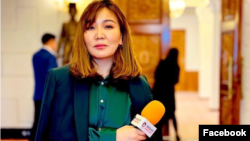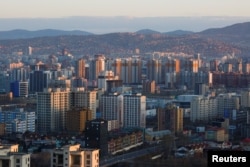The jailing of journalists in Mongolia is rare, which makes the arrest of Unurtsetseg Naran, one of the country's most influential reporters, all the more shocking to the country's media.
Unurtsetseg carved out a reputation for herself in Mongolia as a reporter unafraid to chase down officials for answers. As the editor-in-chief of the news site Zarig, she has fought over a dozen defamation cases in the past five years.
Then came an arrest last month.
Initially detained over accusations of spreading false information and contempt of court, the case later escalated to more serious charges, including allegedly conspiring with foreign intelligence agencies.
The initial charges relate to a Facebook post in which Unurtsetseg said that it was inhumane to prolong the court hearing of an elderly individual, according to reports.
For that, Unurtsetseg was taken into custody on December 4, and a court ordered her held for one month. Access to her news website, Zarig, was also briefly blocked inside Mongolia.
A court later extended the pretrial detention period to two months, and police on Friday raided Zarig's newsroom.
Under Mongolian law, the court can extend pretrial detentions for up to one year until a trial begins, said Unurtsetseg's lawyer Erkhembayar Purevdorj.
The journalist is facing 10 charges, and if convicted, she faces up to eight years in prison, Erkhembayar said.
"The police and prosecutors are punishing her," Erkhembayar said. "This case shows that the Mongolian law enforcement needs to be reformed."
Unurtsetseg denies all the charges. International and Mongolian press freedom groups have decried the arrest as politically motivated.
Mongolia's Washington embassy did not reply to VOA's email requesting comment.
In the Mongolian capital, Ulaanbaatar, fellow journalists see the case as retaliation for Unurtsetseg's critical coverage. Some have also questioned the timing since the country is scheduled to hold parliamentary elections later this year.
"The arrest of Unurtsetseg is a really strong signal to others because they arrested the most powerful journalist, so they can easily arrest us," Bolortuya Uuganbayar, founder of the news site Urug, told VOA.
"If someone very powerful wants to detain a journalist, they can do it, even if there is no evidence," she said.
As editor-in-chief of Zarig, Unurtsetseg is known for what some call her brash reporting style. She is credited in Mongolia for popularizing ambush interviews in which she surprises people and chases them down the street asking questions, according to several Mongolian reporters who spoke with VOA.
Some journalists questioned what they described as Unurtsetseg's sometimes dubious ethics and occasionally sensationalist approach.
But to many, she is a symbol of the average person standing up to the powerful and rooting out corruption.
"A lot of people respect her because she pushes against authority," said Anand Tumurtogoo, who contributes to international media including VOA's Mandarin Service.
In one of Unurtsetseg's best-known investigations, the reporter questioned companies that had defaulted on loans to the Development Bank of Mongolia.
"She's a national debt collector, and she saved Mongolia from failing to pay foreign debt bond payments," Khaliun Bayartsogt, an independent journalist in Ulaanbaatar, told VOA.
Batmunkh Onon, executive director of the pro-democracy group Globe International Center, thinks the authorities were likely just looking for an excuse to punish the vocal reporter.
"They would like to shut the mouths of as many journalists as possible," especially ahead of parliamentary elections in June, she said.
Unurtsetseg herself appears to agree with that assessment. Before being detained, she was quoted in a local English-language paper as saying: "The authorities want to silence everyone until the election."
The journalist's lawyer says the jailing may have severe implications for press freedom in Mongolia.
"Unurtsetseg provides people with the right to know. She keeps people informed," Erkhembayar said. "The government's actions are violating the public's right to know."
Unurtsetseg is no stranger to legal fights. She faced 12 defamation complaints in 2019 and four in 2020, all filed by politicians mentioned in her reporting, according to the International Federation of Journalists.
She won most of the cases but still faces a fine of about $800, which is equal to about two months' salary for a typical journalist in Mongolia, the IFJ said.
Those defamation cases mirror broader trends in Mongolia, where more than half of all defamation cases are brought against reporters and news outlets. About 10 journalists are currently under investigation in Mongolia, including Unurtsetseg, data from the Confederation of Mongolian Journalists shows.
"Censoring critical voices and journalistic professional activities under the guise of criminalizing defamation shows that it is becoming more systematic," Galbaatar Lkhagvasuren, a lawyer at Globe International Center, told VOA.
Unurtsetseg's latest case leaves others concerned that they, too, could be targeted.
Budragchaa Serdamba, a prominent investigative journalist, said he has been inundated on social media with taunts from trolls that he'll be arrested next.
Leading up to her arrest, Unurtsetseg also faced harassment on Facebook, multiple reporters said. Trolls attempted to smear the journalist with allegations that she is corrupt and takes payment in exchange for positive coverage.
The use of promotional agreements in the media — sometimes called censorship contracts — is a common but taboo subject for Mongolian media.
Chronically low pay means many outlets make agreements with government agencies and companies in which outlets are paid to produce positive content and avoid criticism, according to journalists with whom VOA spoke.
"This is the way they survive," Khaliun said.
But the result is that some outlets "become silent," Budragchaa said, and unable to effectively hold officials accountable.
Others see the harassment and accusations of corrupt practices as a concern.
"It's troubling to see attacks against journalists increasing even as media organizations and journalists strive to maintain their integrity and independence," said Galbaatar, from the Globe International Center.
Before her detention, Unurtsetseg had called for the investigation into her case to be conducted openly, according to the English language newspaper UB Post.
"If a journalist becomes silent, the values of a democratic society will disappear," Unurtsetseg said. "I will show that the truth wins. It may take time."






